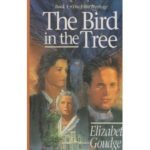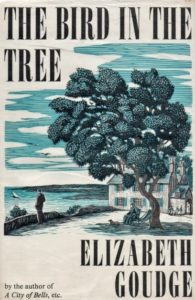The Bird in the Tree by Elizabeth Goudge
“Pick up an Elizabeth Goudge novel and from the first page you will feel your shoulders drop.”
The above quote comes from from Cornflower Books, one of my favorite book blogs. Cornflower hails from somewhere in Northern England and her two blogs are filled with the joy of books such as this, but also gardening, knitting, cooking and art — a kindred spirit. Click above or on the blog list to the left to see for yourself.
 Based on Cornflower’s review and in a desperate mood for an old-fashioned read, I got The Bird in the Tree –with this dreadful cover — from the library. (I much prefer the vintage cover above).
Based on Cornflower’s review and in a desperate mood for an old-fashioned read, I got The Bird in the Tree –with this dreadful cover — from the library. (I much prefer the vintage cover above).
Elizabeth Goudge is a British writer, probably best known for her novel Green Dolphin Street (nope, haven’t read it). The Bird in the Tree is set in 1938 and is the first in a trilogy about the Eliot family and their beloved home, Damerosehay on the Hampshire coast.
Nothing better than a British house setting I thought as I opened the book, trying not to form images of the characters from the tacky 1980’s cover.
The first thing to strike this reader is that Ms. Goudge is verbose. She obviously loved nature and takes pages to describe the beauty in her settings — from the gardens, to the sunsets, grand water views, and even the individual birds.
Soon, however, as the quote above predicted, my shoulders lowered and I relaxed into the slow rhythm and realized I was enjoying some very nice writing.
Early in the novel there’s a flashback to when Lucilla and her young grandson first discover the house that would become Damerosehay. The descriptions (there’s pages of them) of the abandoned home and its gardens makes for some enchanting reading. Here’s just a taste:
…for it was such a garden as neither of them had seen before. It was a wild, crazy garden, the kind of garden in which the sleeping beauty and her court lays sleeping for a hundred years. Once it had been planted with orderly care and neatness, but now all the flowers and trees and bushes had gone mad together with a sort of jubilant madness that was one of the loveliest things Lucilla had ever seem. The rose trees, bright with their new green leaves, were running riot everywhere, climbing up over the old wall, festooning themselves over the cherry trees and oak trees, cherry trees to the east and oaks to the west that grew in the tangle of wild grass that had once been lawns and flowerbeds …
Lucilla,with the help of her children, purchase the house and it is transformed into the warm and beautiful place she wants as a safe haven for her children, their children and generations beyond.
Lucilla and her family are far from perfect. The characters are revealed through both their actions and innermost thoughts and thus, we discover the Eliots share heartbreak and wounds — not to mention the art of manipulation and resentment — all bubbling just beneath the surface. There’s an ill-advised love affair that threatens the Eliot family relations. Some past secrets are revealed and others stay – well secret. But mostly this is a novel about people and a home they love.
Lucilla’s son Hilary (don’t you just love British names) although the least clever of the Elliot family, turns out to be the happiest, in his role as village vicar:
…Fairhaven liked to hear the [church] bell tolling out every morning, sounding through the winter darkness as though to tell them that the night was over or ringing through the spring and summer birdsong like another bird calling in the sky. The ungodly, rousing from sleep, set their watches by this bell, and the godly whilst also setting their watches, remembered that, at this hour Hilary was praying for them. They were glad of that, for they liked Hilary.
Hilary as expected does give deliver advice and counsel, but it’s nothing compared to the morale high ground voiced by Lucilla and her long time ladies maid, Ellen (yes, there’s a lady’s maid). I shook my head in amusement and dismay at their self assurance when weighing in on other people lives.
But in the end, the Eliots love each other and while they suffer from an excess of contemplation, they are good people who do the right thing – and yes, there’s a neatly-tied-up-fairly-happy ending.
Old fashioned, overly sentimental and, at times, melodramatic — The Bird in the Tree was just what the doctor, or in this case, Cornflower Books recommended – I felt better having read it.
The second in this series – Pilgrim’s Inn is on my list for the next time I’m in need of a restorative read.







Hello Deborah and Ray,
How wonderful to come across your mention of Elizabeth Goudge. I recently read The Scent of Water. I was amazed at how deeply it explored the darkness of the soul, spiritual longing, and the healing power of nature and community. It was quite by accident that the book came in to my life.
May this find the two of you well.
Warm Regards,
Esther Liss
Thank you Esther, I found a copy of The Scent of Water at the Big Book Sale and grabbed it based on your recommendation. This copy is published by a Christian press? I’ll read it for the nature and community as you noted…Deb
Love that vintage cover! I turn to Goudge’s books whenever life gets too much, she’s so very soothing.